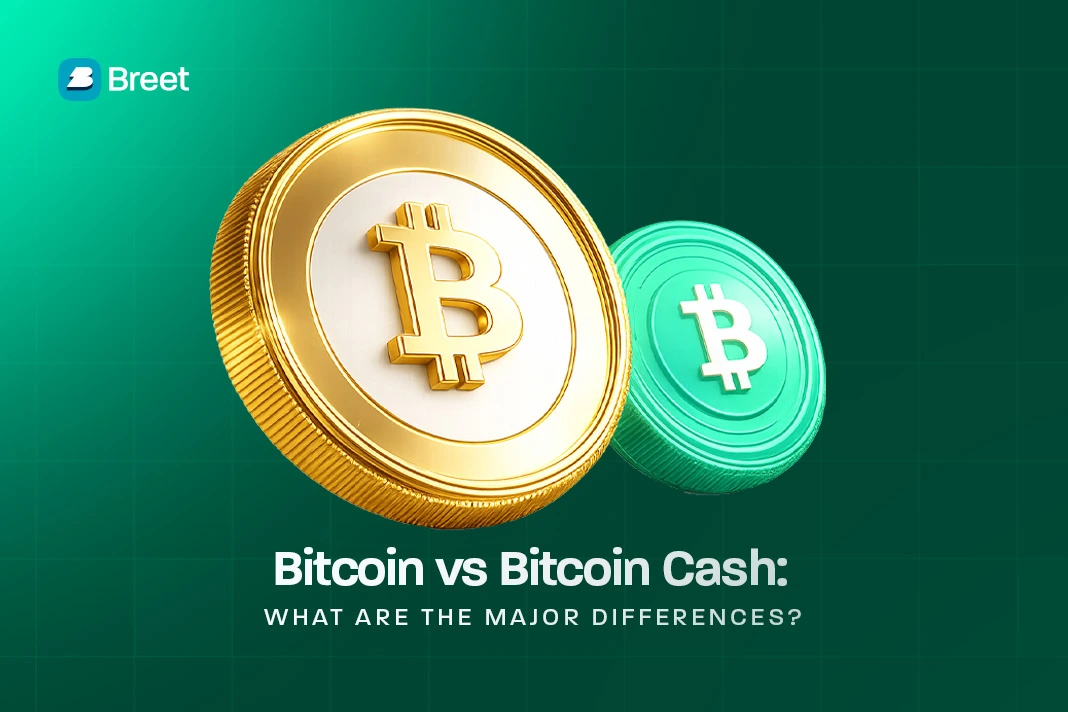Crypto and forex are two distinct trading markets, but they’re often confused for one another. You’ve probably heard people talk about profits, risks, trading pairs, currency pairs, and making fast money. But what do these terms really mean?
If you’ve ever felt confused or unsure about crypto and forex, you’re not alone.
These two markets can seem complex, especially if you’re new to trading.
But don’t worry, this article breaks down the differences between cryptocurrency trading vs forex trading. Sit back and relax as we explore what they are, how they work, and the key differences that set them apart.
Overview: What Is Crypto Trading vs Forex Trading?
Crypto trading is simply swapping digital coins, such as Bitcoin, Ethereum, Solana, and thousands more. You head to an exchange, pick a pair (like BTC/USD), and place buy or sell orders.
Prices move based on blockchain data, social buzz, or big trades. No bank in the middle, no single boss pulling the strings. It’s peer-to-peer, borderless, and always on.
Traders make money by educated guesses on how crypto pairs will perform on the market. They can opt to sell if they think a coin will go up or buy if otherwise.
Forex trading, on the other hand, handles real, government-issued money dollars, euros, yen.
You trade one for another, say EUR/USD or GBP/JPY, through brokers that connect to major banks. It’s the world’s largest market, with over $6 trillion changing hands daily.
When comparing cryptocurrency trading vs forex trading, at the core, both markets invite you to guess how a currency pair will swing.
However, crypto feels wild and free, while forex is more structured and backed by institutions.
Think of crypto as an indie rock concert fast, unpredictable, raw. Forex is classical music time-tested, precise, well orchestrated. Now, let’s discuss how their hours, risks, and rules compare.
Related:
- What is Crypto Arbitrage Trading? & How to Profit from It
Market Hours and Accessibility
Crypto never sleeps, but forex often takes the weekends off. Crypto markets run 24/7, 365 days a year. A tweet, a hack, or a policy change in China can spark a price surge at 2 a.m. in your time zone. I once saw Dogecoin spike 30% overnight, all because of a celebrity retweet.
Forex markets open Sunday at 5 p.m. EST and close Friday at 5 p.m. EST. Trading flows through three major sessions namely, Asia (Tokyo), Europe (London), and North America (New York).
Each session brings its own high and low points. For example, EUR/USD lights up when London and New York overlap around 8 a.m. to noon EST. Then comes a quiet period until Tokyo kicks things off again.
What does that mean for you?
1. Flexibility vs. routine: Crypto lets you trade at midnight, during lunch breaks, or on holidays. Perfect if you work odd hours or love chasing every market swing. Forex sticks to a schedule: weekdays only so you can log off Friday night and relax through the weekend.
2. Ease of entry vs. checks and balances: All you need for crypto is internet access and an exchange account. No proof of income, no hefty deposits. Forex brokers often need KYC checks, small funds, and regulatory approval. Forex has a slower start, but it comes with an added layer of protection.
3. Strategy impact: In crypto, news can wipe out positions while you sleep. In forex, weekend gaps can surprise you, but most big moves wait until markets reopen on Monday.
For cryptocurrency trading vs forex trading, pick crypto if you crave nonstop action. Pick forex if you want clear start and stop times, and fewer out-of-hours surprises.
Volatility and Risk Factors
When it comes to volatility, crypto takes the crown! Cryptos can swing wide. It can get as high as 10–20% in a single day. I once saw Ethereum jump 25% after a network upgrade announcement. It then plunged when whales sold off. Smaller coins act even crazier. Some altcoins double overnight, then crash by half the next day.
Forex pairs like EUR/USD or USD/JPY move in fractions of a percent per day. Sure, significant events like Brexit or Fed rate hikes can shake things up, but most days feel steady. If you’ve traded both, you know crypto waves are jagged and steep, while forex waves roll in slow and smooth.
Here are the key points:
- Liquidity: Forex trades over $6 trillion daily. You can buy or sell massive positions without the price flinching. Crypto’s top coins see around $100 billion in volume daily, even less, so big orders can send price tumbling and Margin.
- Crypto exchanges often let you trade with 50× or 100× leverage. That $100 position controls $5,000 to $10,000 of coins. Huge potential gains , but a small price swing can wipe you out. Forex leverage is capped (e.g., 30:1 in the EU, 50:1 in the US), which limits the wildest swings.
- Risk Management: Both markets reward stop losses and risk-reward rules. But in a fast crypto crash, you may face slippage. Forex slippage happens, too, but less often because of deeper liquidity.
- Psychology: Crypto’s roller coaster can trigger FOMO (fear of missing out) or panic sells. Forex moves slower, letting you think. But be careful slow markets can breed boredom and overtrading.
If you thrive on big thrills, crypto’s your roller-coaster. If you prefer a gentler current, forex offers smoother rides.
For You:
- How to Fix Bitcoin Unconfirmed Transactions (Step-by-Step)
Regulation and Security
Is forex safer than crypto? Let’s compare regulations and safeguards.
Forex Regulation:
Brokers register with bodies like the UK’s Financial Conduct Authority (FCA). The US Commodity Futures Trading Commission (CFTC) and the Australian Securities and Investments Commission (ASIC).
They also keep client funds in separate accounts. Your money isn’t mixed with company cash. Regular audits, capital requirements, and complaint channels protect you. Many regions offer negative-balance protection, so you can’t lose more than you deposit.
Crypto Regulation:
Crypto regulation is still patchy. Some countries license exchanges and enforce KYC (Know Your Customer). Others have no clear rules or outright bans.
There are also no global standards for segregating client assets. Some platforms combine funds or lend them out. Crypto also has several reports of hacks and exit scams yearly.
Security Practices
- Forex brokers often invest heavily in secure data centers and two-factor authentication. Hacks here are rare.
- Top crypto exchanges now use cold storage (offline wallets), insurance funds, and third-party audits. Decentralized exchanges hand control of private keys back to you but if you lose your keys, your coins are gone forever.
Pro tip: In crypto, keep active trading funds on exchanges.
Store the rest in hardware wallets like Ledger or Trezor. In forex, choose a tier-one, regulated broker with transparent fees and client fund protection. Regulation brings peace of mind. But crypto’s freedom has its own excitement if you’re cautious.
Cryptocurrency Trading vs Forex Trading: Key Differences

| Feature | Cryptocurrency Trading | Forex Trading |
|---|---|---|
| Market Hours | 24/7 trading, including weekends | 24/5 trading, closed on weekends |
| Volatility | Highly volatile, large price swings | Less volatile, more stable movements |
| Liquidity | Lower liquidity compared to forex | Very high liquidity |
| Regulation | Lightly regulated in most regions | Heavily regulated by global authorities |
| Assets Traded | Digital currencies like Bitcoin, Ethereum | National currencies like USD, EUR, JPY |
Next Steps to Get Started
- Demo Accounts: First, try paper trading on both platforms. See which style sticks.
- Build a Trading Plan: Define your time frame, position size, stop-loss, and profit target. Write it down.
- Educate Yourself Daily. In forex, follow economic calendars and central bank news. In crypto, track social channels, developer updates, and on-chain metrics.
- Manage Risk: Never risk money you can’t afford to lose. Use small position sizes until you find your edge.
- Keep a Trading Journal: Note date, asset, entry, exit, result, and emotion. Review weekly for patterns.
You Might Like:
- Why is Bitcoin Fee So High? & How to Lower It
Cryptocurrency Trading vs Forex Trading: Which One Should You Trade?
| Features | Crypto Trading | Forex Trading |
|---|---|---|
| Market Hours | Crypto never stops, perfect for night owls and newschaser. | Forex closes on weekends, great if you want a break. |
| Volatility | Crypto jumps fast, driven by tweets, hacks, and hype. | Forex moves slowly, reacting to economic data and politics. |
| Regulation | Crypto regulations vary widely. Some exchanges follow the book, others operate with little oversight. | Forex has strict rules, audits, and client protections. |
| Security Risks | Crypto risks include exchange hacks, lost keys, and rug pulls. | Forex risks come from shady brokers and hidden fees. |
| Ease of Entry | Crypto is just an internet link and a funded wallet. | Forex often requires KYC, proof of identity, and a small deposit. |
| Potential Returns vs. Drawdowns | Crypto offers those big 50%+ leaps but also big crashes. | Forex gives smaller, steadier moves. |
| Learning Curve | Crypto education has plenty of online guides, but ensure you vet your sources. | Forex boasts decades of textbooks, courses, and mentors. |
So, should you trade forex or crypto? It boils down to your goals, style, and appetite for risk. You can also consider trying both. Many traders do. They use forex during the week and switch to crypto on weekends.
That way, they get steady gains and weekend thrills.
How to Convert Your Crypto Profits to Cash
When you cash out big while crypto trading, you might want to get the cash equivalent of your profits.
With Breet, you can trade your crypto-to-cash easily.
Whether it is BTC, ETH, USDC, LTC, or Solana, you get your Naira or Cedis in under five minutes.
Download the Breet App to get started. Join over 250,000 users using Breet for their crypto to cash conversions.
Conclusion
Trading is a journey, not a dash.
Crypto and forex each offer unique paths one unpredictable and raw, the other structured and steady. Neither is “better”; they suit different travelers.
Which road calls you? Structure or spontaneity? Steady growth or adrenaline swings? Remember to trade within your means. Happy trading!








